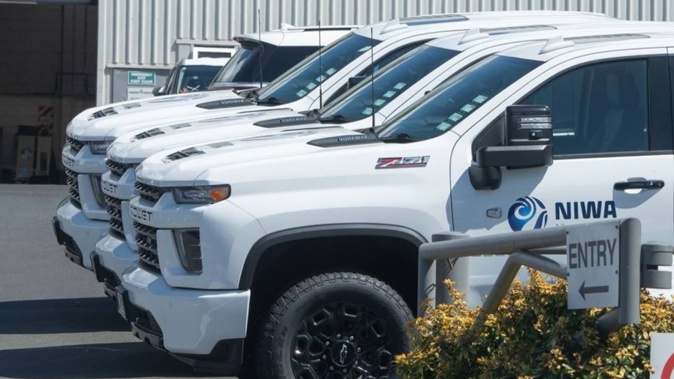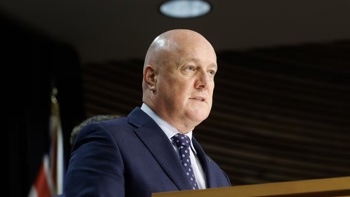
Niwa, the Crown-owned weather research institute, is defending a spend-up on luxury fuel-guzzling utes.
Niwa has purchased four Chevrolet Silverado 4x4 HD LTZ Premium utes, which were seen by the Herald at a North Shore car yard this weekend. The vehicles’ registration appears to show the cars are a 2024 model.
Niwa would not say how much the vehicles cost, citing commercial sensitivity. However, that particular model currently retails at about $172,000, bringing the total cost of the utes to $688,000.
The Government is currently trying to reduce the emissions from the vehicles it owns. Agencies must purchase battery EVs (electric vehicles) or if they are not suitable, a plug-in hybrid (PHEV). If neither of those are suitable, the agency’s chief executive has the ability to sign off on a different vehicle.
/cloudfront-ap-southeast-2.images.arcpublishing.com/nzme/HT6C2YRFIZGBTJX5JMB6IWU5OY.jpg) Niwa's new Chevrolet vehicles. Photo / Corey Fleming
Niwa's new Chevrolet vehicles. Photo / Corey Fleming
Crown Research Institutes like Niwa are not bound by those rules like core Government departments, but must “have regard” to them.
Niwa said in a statement that chief executive John Morgan had signed off on the purchase as being necessary, given the weight of the boats the cars will be towing.
“We investigated all the options in the market and there was no viable alternative to the Silverados, given the weight of the boats they will be towing. We test-drove a wide range of trucks, large and mid-sized utes in a variety of real-world driving conditions to determine what was going to be most suitable and safest for our staff.
“There are no BEV or PHEV options available that can perform the role required.”
The Silverado is vastly more expensive than other utes. A top-of-the-line Ford Ranger Raptor retails for about $90,000.
However, the Silverado does have a greater towing capacity. A “towing test” by Australia’s Car Expert website from last year, using 2023 models of the vehicles, ranked the Silverado a top tower, with a capacity of 4500kgs vs 2500kgs for the Ford Ranger Raptor. However, it criticised the “poor” fuel efficiency of the car. A recent ad said the latest model included an “all-new refined interior, taking luxury to the next level both inside and out”.
Judith Collins, who, as the Minister of Science, Innovation and Technology is one of Niwa’s shareholding ministers, said the purchase was an operational decision for Niwa.
“However, I am satisfied that due diligence has been undertaken and that these vehicles are appropriate, given the nature of the work they will be undertaking,” Collins said.
/cloudfront-ap-southeast-2.images.arcpublishing.com/nzme/FDBD7UFUQZEGPPK7TEXLV5UHMM.jpg) Niwa chief executive John Morgan had signed off on the purchase as being necessary, given the weight of the boats the cars will be towing. Photo / Corey Fleming
Niwa chief executive John Morgan had signed off on the purchase as being necessary, given the weight of the boats the cars will be towing. Photo / Corey Fleming
Taxpayers’ Union head of campaigns Callum Purves told the Herald that it was Niwa “clearly haven’t got the message that the new Government is wanton to rein in the excessive public spending we’ve had for the past six years”.
“They clearly shouldn’t be making such lavish purchases when cheaper alternatives can be found to do the same job,” Purves said.
Niwa said the institute was “committed to reviewing and transitioning its fleet to low emissions vehicles where possible”.
“We have 700 staff in 13 offices and we rely on our vehicles to conduct our science activity across a variety of terrains and environmental conditions. Whether installing climate stations in mountains, conducting field work in remote river basins, boating and diving to carry out essential biosecurity work, or mobilising and demobilising our research vessels, our work requires vehicles that can safely and efficiently move our people and carry heavy loads, transport bulky and oversized kit, ascend and descend steep grades, safely tow trailers and boats, and transport gas cylinders or other hazardous substances,” the Niwa statement said.
“Our work is done throughout the year, from summer ‘low flow’ periods in freshwater rivers and streams, to events-based work, for example during or immediately after environmental hazard events such as floods.”
Thomas Coughlan is Deputy Political Editor and covers politics from Parliament. He has worked for the Herald since 2021 and has worked in the press gallery since 2018.
Take your Radio, Podcasts and Music with you









